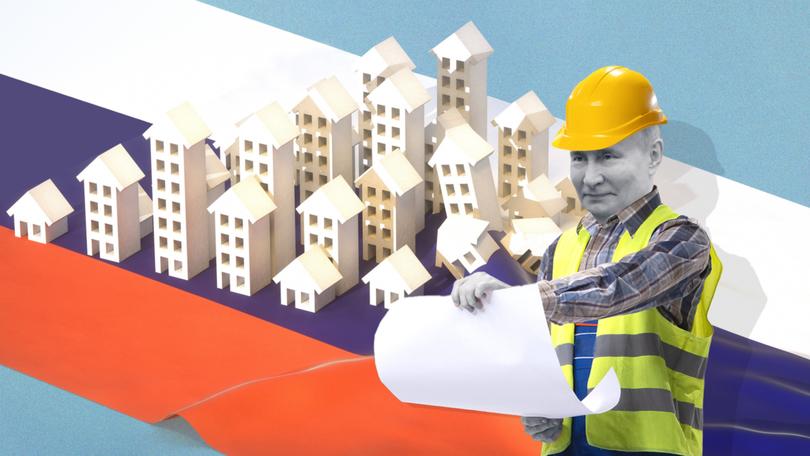The Economist: Vladimir Putin has created a housing bubble through his Russian mortgage scheme
Prices have risen 172 per cent in Russia’s biggest cities.

Mortgages used to be a tough sell in Russia. Decades of Soviet propaganda, which denounced credit as an unbearable burden, had an effect. Even after the end of communism, Russians still referred to mortgages as “debt slavery”, preferring to save until they could buy their homes outright. Vladimir Putin, the country’s president, has spent two decades trying to convince his citizens to take a different view. In 2003, during his first term, he explained that mortgages might help solve “the acute problem of housing” facing Russians. His plea fell on deaf ears.
He is now having more success — and all it took was a heavy dose of statism, as well as the invasion of a peaceful neighbour. Over the past few years, the number of Russians taking out mortgages has soared, owing to a generous program of state subsidies for buyers of new-builds. Mr Putin may have got more than he bargained for, however. The state’s subsidy binge has stoked an ultra-hot property market, sending house prices soaring. As such, the Kremlin has found itself picking up a giant and fast-growing bill.
Sign up to The Nightly's newsletters.
Get the first look at the digital newspaper, curated daily stories and breaking headlines delivered to your inbox.
By continuing you agree to our Terms and Privacy Policy.In 2020, when Russia was gripped by COVID-19, officials increased handouts for those buying freshly constructed properties in an attempt to bolster the economy. At first, banks offered mortgage applicants a preferential rate of around 6 per cent, roughly two percentage points below the market rate, with the state making up the difference. Similar discounts, which had previously only been available to families, were then offered to IT workers and people moving to places including the Arctic, Siberia and occupied Ukraine. Still, mortgage volumes did not begin to really rise until Russia’s economy went on a war footing. Banks issued mortgages worth 7.7trn roubles ($132b) last year, up from a total of 4.3trn in 2020. Most were supported by subsidies.
This reflects the fact that Russians are short of investment opportunities: sanctions weigh on the stock market and currency controls make it hard to move money abroad. Inflation, which came roaring back in mid-2023, has also played a role — and not just by giving Russians an incentive to put money into bricks and mortar. When the Central Bank of Russia (CBR) started raising interest rates, the scheme’s appeal grew. As the CBR lifted its benchmark rate to 16 per cent, the government kept its preferential rate low, raising it to just 8 per cent. In June there was a gap of more than ten percentage points between the government’s rate and the market rate for a mortgage.
As a consequence, the Kremlin is footing a hefty bill. The finance ministry has already spent nearly half a trillion roubles on the scheme. Costs could soon climb higher if, as most analysts expect, the CBR raises rates to 18 per cent on July 26. The boom in subsidised loans has also caused a housing bubble. Last year 110 million square metres of housing were built, compared with an average of just 59 million a year since the end of communism.
At the same time, prices are soaring. The Moscow-based Institute for Urban Economics reckons they climbed by 172 per cent in the biggest cities between 2020 and 2023. Elvira Nabiullina, the CBR’s governor, is spooked. She has blamed the government’s subsidies for “overheating” the housing market and said that they would pose a “proinflationary risk” if the Kremlin failed to wind them down.
Under pressure from the CBR and the finance ministry, the Kremlin has begun to do just that. In December it hiked the minimum deposit required for a loan from 20 per cent to 30 per cent. Earlier this month it ended its most popular scheme, which was for buyers of new-builds. The number of new mortgages could drop by some 50 per cent in the second half of the year, according to one analyst quoted by state-affiliated media.
Russia’s construction industry will suffer as a result. So will banks, which have enjoyed record profits driven by rapid growth in mortgage portfolios. For now, though, the housing market looks like it will manage to avoid a collapse. Vasily Astrov of the Vienna Institute for International Economic Studies says that “deceleration and possibly stagnation” are likelier than a big drop in prices.
Russia’s red-hot war economy, which has seen bumper wage growth this year, may yet prove able to sustain a robust property market even in the face of higher rates and slimmed-down state support. The economy has defied doubters so far. And Russians seem willing to bet the house on it.
